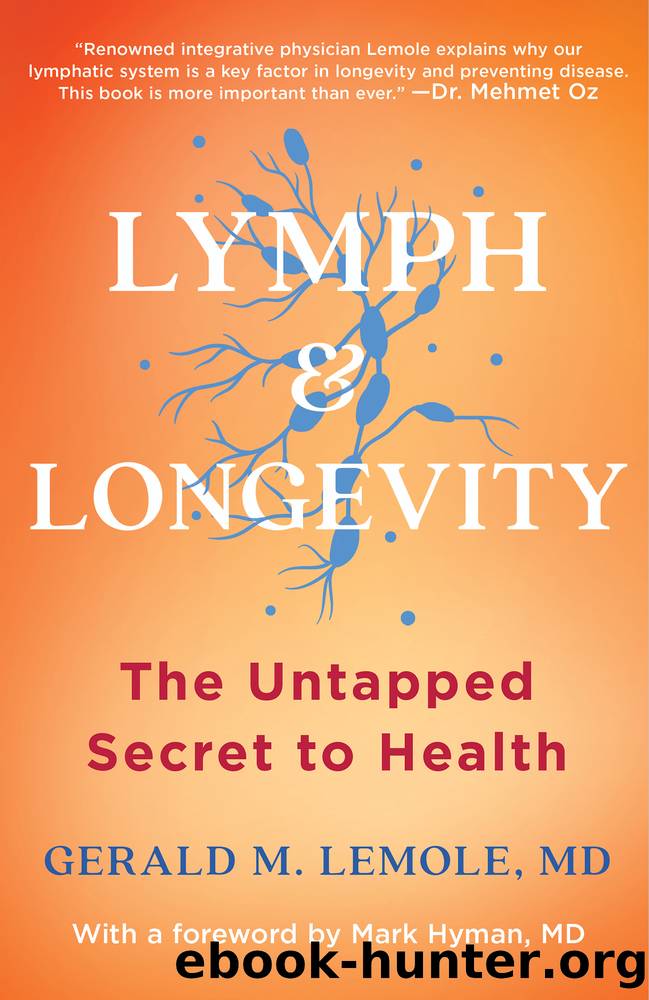Lymph & Longevity by Gerald Lemole

Author:Gerald Lemole
Language: eng
Format: epub
Publisher: Scribner
Published: 2021-10-05T00:00:00+00:00
What Kind of Eater Are You?
More and more Americans are becoming aware that meat loaf and mashed potatoes arenât the best dietary pathway to heathy living. Many know that the standard American diet is about as good for you as driving drunk without a seatbelt. Thatâs why many people have turned to other dietary approaches to prevent and reverse disease. Some of these popular diets are:
Vegetarian: This diet consists of vegetables and fruits and omits any meats or meat products. A vegan diet allows for no animal products, and an ovo or lacto vegetarian diet allows for eggs and milk or cheese.
The vegetarian diet has been studied most extensively and for a longer period of time than any other diet, so choosing a vegetarian diet is a safe bet for health. The only caveat is that B12, which is obtained from meat, has to be supplemented.
Lectin-free: This diet avoids most grains, uses only pressure-cooked beans, and requires peeling and seeding of vegetables that have seeds in them, such as tomatoes and peppers. Lectins are defensive toxic molecules that plants have developed over millions of years that are poisonous to animals, which try to eat the fruit, leaf, or stem of the plant. Gluten (gliadin) is a lectin protein found in many grainsâwheat, rye, oats, etc., that causes celiac disease by opening the connections between the cells of the GI tract and allowing toxins to come in and fluids to egress. This is a very restrictive dietâno grains, seed-bearing plants such as tomatoes and eggplantâand somewhat difficult to comply with.
Mediterranean: This diet, which was typified by the inhabitants of Mediterranean countries like Turkey, Greece, Italy, and Spain, was more properly organized as the specific Mediterranean diet in the early 1990s by Harvardâs Dr. Walter Willett. Along with various fruits and vegetables, certain types of fats, seafood, whole grains, yogurt, hummus, tabbouleh, and nuts and seeds, the diet features many spices and herbs that have benefits to the lymph system. These include turmeric, ginger, and astragalus.
A very significant feature of the Mediterranean diet is that there is very little meatâparticularly less red meatâthan in the standard American diet, and few processed foods, especially processed grains and sweeteners. The Mediterranean diet is associated with lower all-cause mortality, decreased risk of metabolic and cardiovascular disease, and lower body weight and metabolic syndrome. The Mediterranean diet is typically lower in saturated fats and higher in oils, especially monosaturated olive oil. The polyphenols in olive oil have been shown to be especially beneficial in Alzheimerâs disease and other neurologic disorders. Dr. Steven Gundry, proponent of the lectin-free diet, has stated that the only use of salad is to be a vehicle to deliver polyphenol rich olive oil. The diet also propounds the use of a moderate level of red wine with mealsâno more than one to two glasses a day. Of course, itâs important to recognize that along with the Mediterranean diet, exercise and stress modification are essential partners.
How to Supplement
Supplementation of micronutrients is worth considering to make sure you get all of the health (and lymph) benefits they provide.
Download
This site does not store any files on its server. We only index and link to content provided by other sites. Please contact the content providers to delete copyright contents if any and email us, we'll remove relevant links or contents immediately.
| Administration & Medicine Economics | Allied Health Professions |
| Basic Sciences | Dentistry |
| History | Medical Informatics |
| Medicine | Nursing |
| Pharmacology | Psychology |
| Research | Veterinary Medicine |
A History of the Human Brain by Bret Stetka(488)
Basic Exercise Physiology by Moran S. Saghiv & Michael S. Sagiv(458)
The Spike by Mark Humphries;(457)
The Plague Cycle by Charles Kenny(440)
The Whole-Body Microbiome by Brett Finlay & Jessica Finlay(415)
Virus Mania by Torsten Engelbrecht; Köhnlein Claus(395)
Reviews of Physiology, Biochemistry and Pharmacology by Unknown(374)
The Genetic Lottery by Kathryn Paige Harden(372)
Your Brain on Exercise by Gary L. Wenk(337)
Lymph & Longevity by Gerald Lemole(329)
Biophysics of Membrane Proteins by Unknown(322)
Soft-Wired: How the New Science of Brain Plasticity Can Change Your Life by Dr. Michael Merzenich Phd(291)
Fixing My Gaze by Susan R. Barry; Oliver Sacks(282)
Corona, False Alarm?: Facts and Figures by Karina Reiss && Sucharit Bhakdi(280)
Anatomy of the human body: Anatomy body part by Anik Ahmed(280)
Netter's Clinical Anatomy E-Book by John T. Hansen(277)
Structural Immunology by Unknown(248)
Essentials of Pathophysiology by Tommie L. Norris(238)
Complex Cases and Comorbidity in Eating Disorders by Riccardo Dalle Grave & Massimiliano Sartirana & Simona Calugi(219)
